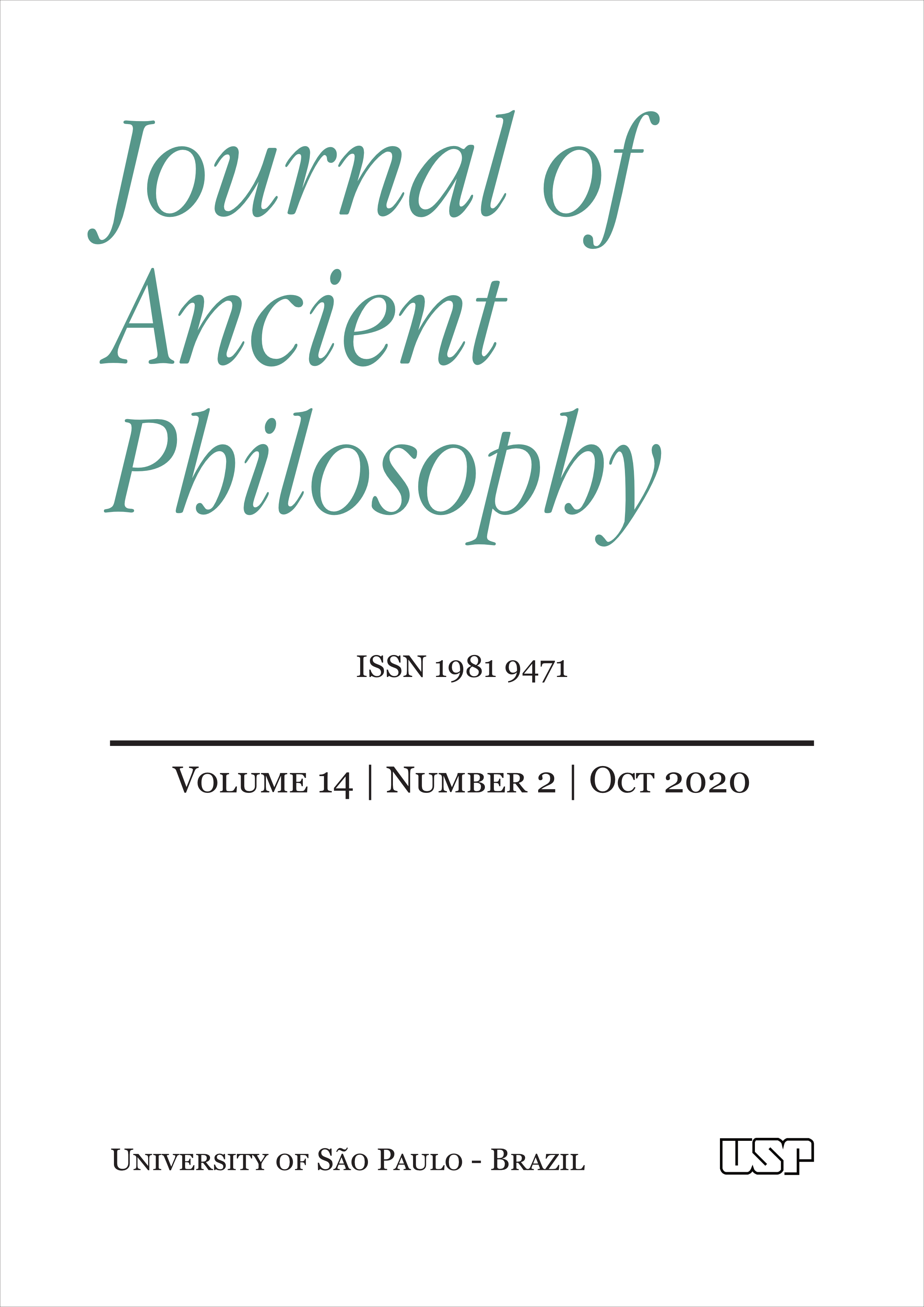Before and After Philosophy takes Possession of the Soul
The Ascetic and the Platonic Interpretation
DOI:
https://doi.org/10.11606/issn.1981-9471.v14i2p53-75Keywords:
Soul, asceticism, Plato , PhaedoAbstract
In the Phaedo, to explain why the philosopher lives in the unusually ascetic way he does, Socrates explains what someone realizes when philosophy takes possession of his soul and how he changes his behavior on the basis of this information. This paper considers the conception of belief the character uses in this explanation and whether it is the same as the conception Michael Frede thinks the historical Socrates is likely to have held and that the Stoics much later incorporated into their doctrine of practice.
Downloads
References
Alesse, Francesca (2015). “Le Phédon dans le Stoïcisme hellénistique et post-hellénistique”. Ancient Readings of Plato’s Phaedo. Edited by Sylvain Delcomminette, Pieter d'Hoine, and Marc-Antoine Gavray. Brill, 63-89. https://doi.org/10.1163/9789004289543_005
Alesse, Francesca (2018). “The Influence of the Platonic Dialogues on Stoic Ethics from Zeno to Panaetius of Rhodes”, Brill’s Companion to the Reception of Plato in Antiquity. Edited by Harold Tarrant, François Renaud, Dirk Baltzly, and Danielle A. Layne. Brill, 46-57. https://doi.org/10.1163/9789004355385_004
Bobonich, Christopher (2002). Plato’s Utopia Recast – His Later Ethics and Politics. Oxford University Press. DOI:10.1093/0199251436.001.0001
Burnet, John (1900). Platonis Opera, Vol. I. Tetralogias I-II. Oxford University Press, 1900.
Burnet, John (1911) Plato’s Phaedo. Oxford University Press. DOI:10.1093/actrade/ 9780198140146.book.1
Butler, Travis (2012). “A Riveting Argument for Asceticism in the Phaedo”, History of Philosophy Quarterly 29: 103–123.
Butler, Travis (2017). “Bodily Desire and Imprisonment in the Phaedo”, Logical Analysis and History of Philosophy, 20: 83-102. https://doi.org/10.30965/26664275-02001006
Butler, Travis (2019). “Refining Motivational Intellectualism: Plato’s Protagoras and Phaedo”, Archiv für Geschichte der Philosophie, 101: 153-176. https://doi.org/10.1515/agph-2019-2002
Brennan, Tad (2003). “Stoic Moral Psychology”, The Cambridge Companion to the Stoics. Edited by Brad Inwood. Cambridge University Press: 257-294. https://doi.org/10.1017/CCOL052177005X.011
Duke, E. A. (1995) Platonis Opera, Vol. I. Tetralogias I-II. Edited by E. A. Duke, W. F. Hicken, W. S. M. Nicoll, D. B. Robinson, and J. C. G. Strachan. Oxford University Press. DOI: 10.1093/actrade/9780198145691.book.1
Ebrey, David (2017). “The Asceticism of the Phaedo: Pleasure, Purification, and the Soul’s Proper Activity”, Archiv für Geschichte der Philosophie, 99: 1-30. https://doi.org/10.1515/agph-2017-0001
Frede, Michael (1992). “Plato’s Arguments and the Dialogue Form”, The Methods of Interpreting Plato and his Dialogues. Edited by James Carl Klagge and Nicholas D. Smith, Oxford Studies in Ancient Philosophy – Supplementary Volume: 201-219.
Frede, Michael (2000). "The Philosopher”, Greek thought: A Guide to Classical Knowledge. Edited by Jacques Brunschwig and Geoffrey E. R. Lloyd. Cambridge University Press: 3-16.
Frede, Michael (2011). A Free Will. Origins of the Notion in Ancient Thought. Edited by A. A. Long. University of California Press.
Fowler, Harold (1914). Plato, Euthyphro, Apology, Crito, Phaedo, Phaedrus. Harvard University Press.
Gallop, David (1975). Plato. Phaedo. Oxford University Press.
Harry, J. E. (1909) “Plato, Phaedo 66B”, Classical Review, 23, 7: 218-221. DOI: https://doi.org/10.1017/ S0009840X00003917
James, William (1918). The Principles of Psychology, Volume II. Henry Holt and Company.
Jones, Russell E. & Marechal, Patricia (2019). “Plato’s Guide to Living with Your Body”, The History of Philosophy of Mind. Volume 1: Philosophy of Mind in Antiquity Edited by John E. Sisko. Routledge: 84-100. https://doi.org/10.4324/9780429508219
Kamtekar, Rachana (2006) “Speaking with the Same Voice as Reason: Personification in Plato’s Psychology”, Oxford Studies in Ancient Philosophy, 31: 167-202. https://doi.org/10.1017/CBO9780511977831.007
Long, A. A. (1998) “Plato’s Apologies and Socrates in the Theaetetus”, Method in Ancient Philosophy. Edited by Jyl Gentzler. Oxford University Press: 113-136.
Long, A. A. (2002) Epictetus: A Stoic and Socratic Guide to Life. Oxford University Press. DOI:10.1093/01992 45568.001.0001
Matthews, Gareth (2009). “Whatever Became of the Socratic Elenchus? Philosophical Analysis in Plato”, Philosophy Compass, 4/3: 439-450. https://doi.org/10.1111/j.1747-9991.2009.00217.x
Pollock, John (2006). Thinking about Acting. Logical Foundations for Rational Decision Making. Oxford University Press. DOI:10.1093/acprof:oso/9780195304817.001.0001
Robins, I. (2003) “Phaedo 82d9-84b8: Philosophers' Understanding of their Souls”, Aperion, 36.1, 2003, 1-24. https://doi.org/10.1515/APEIRON.2003.36.1.1
Russell, Daniel C. (2005) Plato on Pleasure and the Good Life. Oxford University Press. DOI:10.1093/019928 2846.001.0001
Sedley, David & Long, Alex (2011) Plato, Meno and Phaedo. Cambridge University Press. https://doi.org/10. 1017/ CBO9780511780653
Stephens, William O. (2013) “The Roman Stoics on Habit”, A History of Habit: From Aristotle to Bourdieu, 37-65. Edited by Tom Sparrow and Adam Hutchinson. Lexington Books.
Willburn, Josh (2011). “Review of Plato, Meno and Phaedo, David Sedley (ed.), and Alex Long (ed., tr.)”, Notre Dame Philosophical Reviews. 2011.05.09.
Woolf, Raphael (2004). “The Practice of a Philosopher”, Oxford Studies in Philosophy, 26: 97-129.
Zeyl, Donald (1987). Plato. Gorgias. Hackett Publishing Company.
Downloads
Published
Issue
Section
License

This work is licensed under a Creative Commons Attribution 4.0 International License.
Copyright
Authors who publish with this journal agree to the following terms:
- Authors retain copyright and grant the journal right of first publication with the work simultaneously licensed under a Creative Commons Attribution License (CC By 4.0) that allows others to share the work with an acknowledgement of the work's authorship and initial publication in this journal.
- Authors are able to enter into separate, additional contractual arrangements for the non-exclusive distribution of the journal's published version of the work (e.g., post it to an institutional repository or publish it in a book), with an acknowledgement of its initial publication in this journal.
- Authors are permitted and encouraged to post their work online (e.g., in institutional repositories or on their website) prior to and during the submission process, as it can lead to productive exchanges, as well as earlier and greater citation of published work (See The Effect of Open Access).


